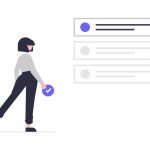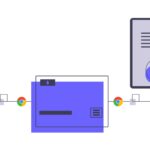If you want to succeed in business in a fast changing world, you have to adapt and keep up with those changes. Now more than ever, we live in an age of data. As more and more of our lives and communication go online, we create billions of data points on the internet. Having the right tools to collect and interpret those data points is key to understanding your current and future customers.
Of course, it would be impossible to go out and find all the information you’re looking for manually. Especially as you grow your business and need data on a larger scale. You could spend days collecting information only for it to change before you’re finished. This is where data scraping comes in.
Data scraping is the process of using a software program to search online sources for certain pieces of information. The scraping tool can then populate a spreadsheet with the data it finds in an organized and useful format. Now you’ve taken all those far-flung data points and created a usable, searchable database for your business.
What does data scraping look like?
Here’s an example of what data scraping could look like, in case you’re still not quite sure. This about hashtags for a moment, those words stuck together with a # symbol on social media. These started out on Twitter but now they’re everywhere. Hashtags allow someone to scour through all the content on Twitter, or another platform, and find every post that’s talking about that topic.
Using a data scraping tool, you can collect every reference to a word or string of words from a website, a group of websites, or a social media platform. Using Twitter as an example, you could find every post containing a company name and create a spreadsheet. You can collect the content of the posts, the URLs, and the usernames who posted them. This is invaluable on social media (where word of mouth spreads quickly) and also very helpful on other sites which are harder to search.
The world’s largest data scraper
The best example of a data scraper is probably Google. They use technology to “crawl” websites and determine the subject matter and quality of sites for their search engine results. If you’re interested in a topic, Google can tell you exactly which sites are talking about it. They use this info to give us great search results and make their service more relevant and useful. We reward them by using Google every time we forget an actor’s name or need to find pizza nearby.
How is data used?
So, how can you make the most of data scraping in your business? You can use data collected by a scraper in many ways to find new customers and improve customer experience so you keep the ones you already have.
One obvious use of scraping is to collect references to your product or service online. Anywhere your company or product’s name is used, you can see what’s being said and create a searchable database of customer comments and opinions. This goes way beyond the reviews and comments on your website or ecommerce platform. Anyone telling their friends about your product, in a good or bad way, will be scrapable if posted publicly on social media. This gives you better control of your public image and allows you to stay on top of customer experience, even if they’re not telling you directly about their issues.
You could also scrape for references to your competitors or the pain points and problems your company solves. If you have a product that relieves back pain, you could find out what potential customers are saying about back pain. This is a powerful way to collect data which you can use to shape your marketing or redesign your product.
How can data be misused?
Data scraping has gotten a bad name recently because of abuse. Like any technology, there are ways to use it unethically and there are people willing to abuse the technology in that way. One of the biggest misuses of data scraping is gathering email addresses and build mailing lists to sell to spammers and people running scams.
In this case, the scrape is really unethical because the data will be in an unethical way. A very similar process could be ethical if the addresses are publicly available and would be used in a non-invasive way. Determining the right way to utilize data is just one of the necessary decisions in an age when everything is online and visible.
How will you use the data?
This is the really important question. The possibilities are endless when you consider the data you can collect and how it can give you insights into your market and how to better serve it. The options are as diverse as the businesses collecting data. The right data at the right time can accelerate your product development process and help you leapfrog your competition.
Here are a few of the ways you can leverage data scraping to enhance your business:
E commerce
- Track product pricing from competitors’ sites
- Keep track of feedback and reviews on your products and competitors’ products
- Collect images and product descriptions from competitors
Marketing
- Collect customer data and feedback to build your marketing strategy
- Pull in information from many sources to curate valuable marketing content
- Track your reputation in the market
- Collect details on competitors to see where to differentiate
- Scrape job boards and ads to collect hot leads looking for what you have
SEO
- Find out who is ranking in search engines for certain terms
- Check the title tags and keywords they are using
- Develop a strategy to move up in search results
As you can see, data scraping has many uses in a wide range of industries and this post is only scraping the surface. Every day it becomes more vital to collect data and store it in a useful way that you can actually read and analyze. It’s what allows big companies to grow bigger and small companies to level the playing field. What will you do with the data you collect?



